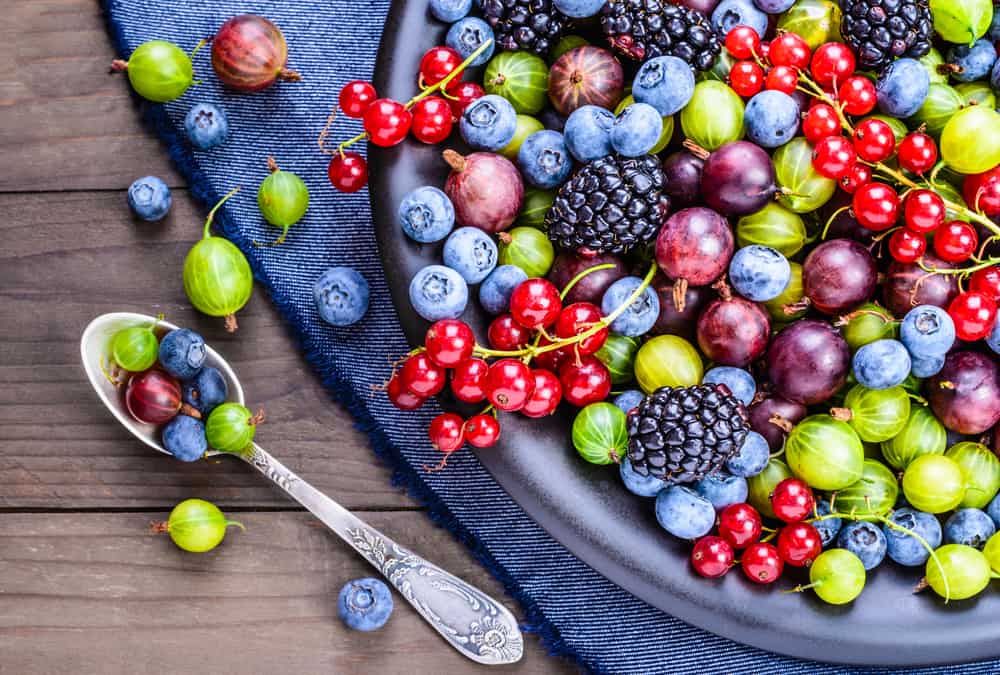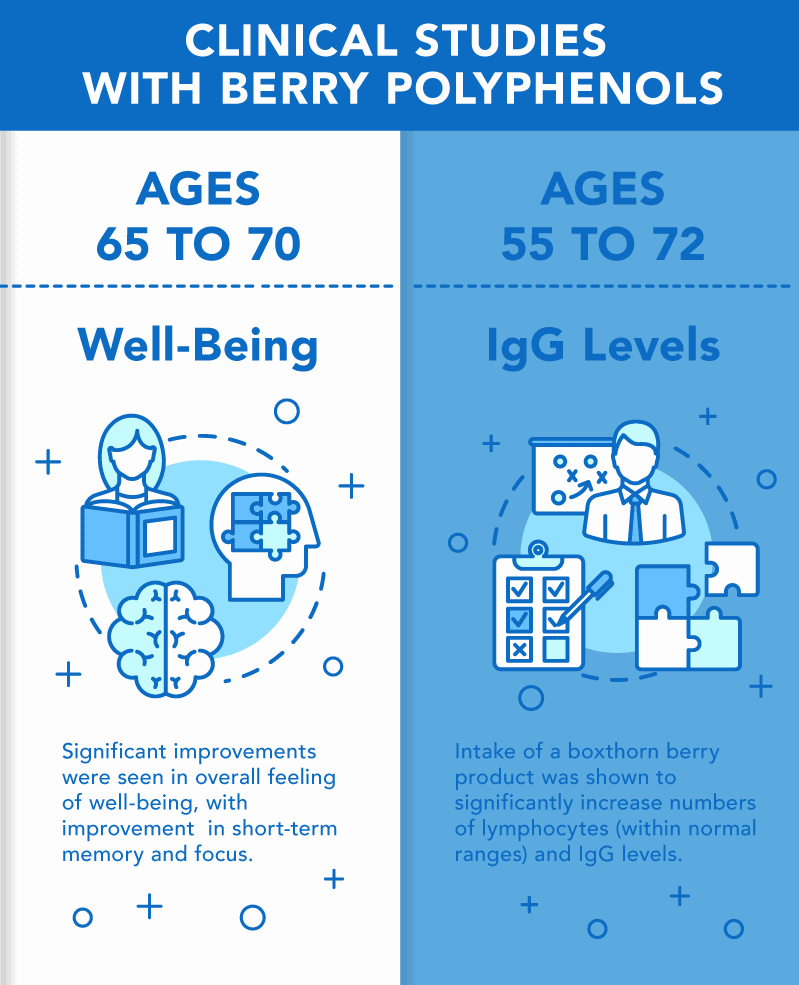Share this post
The abundant polyphenols found in berries deliver numerous health benefits
Of all fruits, the consumption of fresh berries is something we oft seek out more than their somewhat more boring apple or banana counterparts. Whether it be berry smoothies; berry cobblers, pies, or crisps; homemade berry wines; or simply fresh berries eaten by the handful when purchased at the farmer’s market – we all probably can remember the last fresh berry product we consumed, which are found abundantly in restaurants and groceries and picnics in the summer.
Berries are excellent sources of polyphenols. Polyphenols are antioxidant compounds that are considered secondary metabolites of plants.[1] They serve to protect the plants in which they are found from environmental challenges including the damaging rays of the sun, insects, disease, and other possible threats to their survival.
More than 8,000 different polyphenols are found in the plant species we consume as food or use medicinally.[1],[2] Although some of these compounds have similar effects in the body due to their related structures, the fact that they are so numerous sheds light on the importance of eating a whole foods diet that provides a rainbow of natural colors. Nature’s colorful rainbow is produced by the interactions of light with the polyphenols and other phytonutrient compounds found within the flora abundant on our earth.
Herein, we take a closer look at the beneficial effects of berry polyphenols on health, with a focus on immunity.
The beneficial actions of berry polyphenols
Both the seeds and skins of grapes and berries are rich in polyphenols including gallic acid, catechin, and epicatechin (which we also find at high levels in green tea), as well as quercetin.
Grapes (which are technically a berry, although we oft consider them as their own subset of fruit) bring us high levels of the well-known polyphenol resveratrol, found primarily in the grape skin.[3] Grape seeds and skin, including the products remaining after the processing associated with wine or juice, have a very high antioxidant capacity, making this a valuable byproduct for potential use in animal feed or the supplement industry.[4],[5] Both the seeds and skins of grapes and berries are rich in important procyanidins and proanthocyanidin members of the polyphenol family including gallic acid, catechin, and epicatechin (which we also find at high levels in green tea), as well as quercetin.[6],[7]
Both animal and human studies have shown enhanced antioxidant status and reduced levels of inflammation with grape seed extract supplementation.[8],[9],[10],[11],[12] In animals, grape seed extract products have been shown to benefit the brain, reducing inflammation, amyloid-β accumulation, and the impact of age on various markers of antioxidant status.[13],[14] In humans, we see their benefits on metabolic health elucidated in a 2020 systemic review and meta-analysis of randomized controlled trials, finding they positively impact fasting glucose, cholesterol balance, and inflammation.[15]
Grape seed extracts have been shown to benefit the brain, reducing inflammation, amyloid-β accumulation, and the impact of age on various markers of antioxidant status.
These are not the only benefits of berry polyphenols – we also find these potent antioxidants with prebiotic potential have a positive impact on immune function and gastrointestinal health.[16] The addition of berry extract products to the diet of animals has been shown to enhance levels of protective immunoglobulins and the response to vaccinations,[9],[17],[18],[19] increase levels of healthy gastrointestinal flora (including lactobacilli and bifidobacteria), and reduce intestinal inflammation as well as levels of potentially pathogenic bacteria.[16]
Clinical studies with berry polyphenols
In a randomized double-blind, placebo-controlled trial of elderly individuals, supplementation with a wolfberry-enhanced milk product significantly improved the vaccination response.
Positive effects on immune function, wellbeing, and gut health have also been seen clinically, particularly in the elderly, in studies with berry or berry polyphenol supplementation. In a randomized, double-blind, placebo-controlled trial (RDBPCT) of older individuals ranging in age from 55 to 72, intake of a boxthorn berry product was shown to significantly increase numbers of lymphocytes (within normal ranges) and IgG levels.[20] Significant improvements were seen in overall feeling of well-being, which included sub-parameters of dizziness, fatigue, and sleep, while a trend of improvement was also seen in short-term memory and focus. In another RDBPCT of elderly individuals (age 65 to 70), supplementation with a wolfberry-enhanced milk product significantly increased influenza-specific IgG levels and seroconversion rate after influenza vaccination.[21]
In humans, regular intake of 100% grape juice has also been observed to be beneficial. 100% grape juice consumption was associated with increased levels of γδ-T cells (which function as a bridge between the innate and adaptive immune response[22]) as well as vitamin C levels.[23] Human consumption of a cranberry polyphenol blend has also been shown to significantly increase proliferation of γδ-T cells (observed in a cell culture) compared to placebo, which was accompanied by a significant reduction in cold and flu symptoms in the individuals taking the polyphenol blend.[24] Intake of berry-derived preparations has also been shown to increase levels of lactobacilli and bifidobacteria in the human gut.[16]
Given that we consume between 200 to 300 mg of polyphenols per 100 g of commonly consumed fresh fruits, dietary intake can be substantial in a diet with a high level of fruit and vegetable intake.[1],[2] Although supplementation always is an option, the studies discussed herein pointedly remind us: don’t forget to eat your fruits and vegetables!
Click here to see References
[1] Pandey KB, Rizvi SI. Plant polyphenols as dietary antioxidants in human health and disease. Oxid Med Cell Longev. 2009 Nov-Dec;2(5):270-8.
[2] Panche AN, et al. Flavonoids: an overview. J Nutr Sci. 2016 Dec 29;5:e47.
[3] Li X, et al. Extractable amounts of trans-resveratrol in seed and berry skin in Vitis evaluated at the germplasm level. J Agric Food Chem. 2006 Nov 15;54(23):8804-11.
[4] Yilmaz Y, Toledo RT. Oxygen radical absorbance capacities of grape/wine industry byproducts and effect of solvent type on extraction of grape seed polyphenols. J Food Comp Anal. 2006 Feb 1;19(1):41-8.
[5] González-Paramás AM, et al. Flavanol content and antioxidant activity in winery byproducts. J Agric Food Chem. 2004 Jan 28;52(2):234-8.
[6] Yilmaz Y, Toledo RT. Major flavonoids in grape seeds and skins: antioxidant capacity of catechin, epicatechin, and gallic acid. J Agric Food Chem. 2004 Jan 28;52(2):255-60.
[7] Khanal RC, et al. Procyanidin composition of selected fruits and fruit byproducts is affected by extraction method and variety. J Agric Food Chem. 2009 Oct 14;57(19):8839-43.
[8] Grases F, et al. Effect of consuming a grape seed supplement with abundant phenolic compounds on the oxidative status of healthy human volunteers. Nutr J. 2015 Sep 9;14:94.
[9] Farahat MH, et al. Effect of dietary supplementation of grape seed extract on the growth performance, lipid profile, antioxidant status and immune response of broiler chickens. Animal. 2017 May;11(5):771-7.
[10] Balu M, et al. Age-related oxidative protein damages in central nervous system of rats: modulatory role of grape seed extract. Int J Dev Neurosci. 2005 Oct;23(6):501-7.
[11] Natella F, et al. Grape seed proanthocyanidins prevent plasma postprandial oxidative stress in humans. J Agric Food Chem. 2002 Dec 18;50(26):7720-5.
[12] Parandoosh M, et al. The effects of grape seed extract (Vitis vinifera) supplement on inflammatory markers, neuropeptide Y, anthropometric measures, and appetite in obese or overweight individuals: A randomized clinical trial. Phytother Res. 2020 Feb;34(2):379-87.
[13] Wang YJ, et al. Consumption of grape seed extract prevents amyloid-beta deposition and attenuates inflammation in brain of an Alzheimer’s disease mouse. Neurotox Res. 2009 Jan;15(1):3-14.
[14] Balu M, et al. Rejuvenation of antioxidant system in central nervous system of aged rats by grape seed extract. Neurosci Lett. 2005 Aug 5;383(3):295-300.
[15] Asbaghi O, et al. The effects of grape seed extract on glycemic control, serum lipoproteins, inflammation, and body weight: A systematic review and meta-analysis of randomized controlled trials. Phytother Res. 2020 Feb;34(2):239-53.
[16] Govers C, et al. Review of the health effects of berries and their phytochemicals on the digestive and immune systems. Nutr Rev. 2018 Jan 1;76(1):29-46.
[17] Iqbal Z, et al. Replacement effect of vitamin E with grape polyphenols on antioxidant status, immune, and organs histopathological responses in broilers from 1-to 35-d age. J App Poultry Res. 2015 Jun 1;24(2):127-34.
[18] Wang X, et al. Effects of dietary grape seed polyphenols supplementation during late gestation and lactation on antioxidant status in serum and immunoglobulin content in colostrum of multiparous sows. J Anim Sci. 2019 May 30;97(6):2515-23.
[19] Hao R, et al. Effects of grape seed procyanidins on growth performance, immune function and antioxidant capacity in weaned piglets. Livestock Sci. 2015 Aug 1;178:237-42.
[20] Amagase H, et al. Immunomodulatory effects of a standardized Lycium barbarum fruit juice in Chinese older healthy human subjects. J Med Food. 2009 Oct;12(5):1159-65.
[21] Vidal K, et al. Immunomodulatory effects of dietary supplementation with a milk-based wolfberry formulation in healthy elderly: a randomized, double-blind, placebo-controlled trial. Rejuvenation Res. 2012 Feb;15(1):89-97.
[22] Holtmeier W, Kabelitz D. Gamma-delta T cells link innate and adaptive immune responses. Chem Immunol Allergy. 2005;86:151-83.
[23] Rowe CA, et al. Regular consumption of concord grape juice benefits human immunity. J Med Food. 2011 Jan-Feb;14(1-2):69-78.
[24] Nantz MP, et al. Consumption of cranberry polyphenols enhances human γδ-T cell proliferation and reduces the number of symptoms associated with colds and influenza: a randomized, placebo-controlled intervention study. Nutr J. 2013 Dec 13;12:161.
The information provided is for educational purposes only. Consult your physician or healthcare provider if you have specific questions before instituting any changes in your daily lifestyle including changes in diet, exercise, and supplement use.
Share this post
Dr. Carrie Decker
Related posts
Vitamin C for Opioid Addiction
What we know about ascorbate for withdrawal and cravings Part 2 in our three-part series on vitamin C, pain, and opioid use disorder. I first heard that vitamin C could help with opioid use disorder when I was asked to write an article on vitamin C, mood, and addiction for Nutrition in Focus. The…
Vaccine Efficacy, Part 2 of 2: Can a Healthy Gut Microbiome Improve It?
The influence of probiotics on the immune response Vaccines are among the greatest successes of modern medicine, helping to protect entire populations against a wide range of infectious diseases.[1] However, there is considerable variation in the efficacy of vaccines amongst individuals.[2] The magnitude of antibody titers induced in individuals receiving the seasonal influenza vaccine,…
Natural Support for the Fight Against Infections
Andrographis, cat’s claw, humic acid, and monolaurin In 2020 we became all too aware of how infectious disease seriously threatens the health of people worldwide. Fortunately, there is ongoing investigation of nutrients, herbs, and other natural substances that may help fight common injurious microbes, especially when conventional medicine fails to deliver.[1] In today’s post…
Nrf2, Antioxidant Superhero
Fighting oxidative stress and inflammation with natural substances If you cut up an apple and leave it on the counter, you may notice its white flesh turn to brown. A similar effect happens to our own cells when they’re exposed to unstable molecules known as free radicals. This “rusting,” or “browning” process is called…
Vitamin E and Immunity, Part 2 of 2
The role that tocotrienols play in inflammation, immunity, and lung health In addition to the tocopherol members of the vitamin E family, of which α-tocopherol dominates research, α-, β-, γ- and δ-tocotrienols also exist. Numerous studies suggest that tocotrienols have superior antioxidant and anti-inflammatory properties. However, they account for less than 5% of vitamin…
Study Identifies Widespread Inadequacies of Immune Health Nutrients
Key nutrient shortfalls may increase the risk of infections Ideally, a well-balanced, nutrient-dense diet, including a variety of colorful fruits and vegetables, whole grains, legumes, healthy fats, and a balanced selection of proteins can meet all of one’s daily requirements for essential vitamins and minerals, as well as essential fatty acids (EFAs), amino acids,…
Categories
- Botanicals (56)
- GI Health (53)
- Healthy Aging (121)
- Immune Support (39)
- In The News (39)
- Kids Health (21)
- Stress and Relaxation (50)
- Uncategorized (1)
- Video (9)
- Vitamins & Minerals (51)





